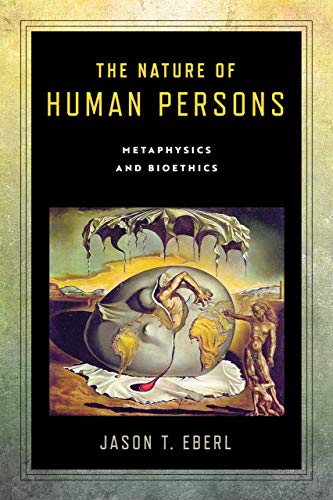Is there a shared nature common to all human beings? What essential qualities might define this nature? These questions are among the most widely discussed topics in the history of philosophy and remain subjects of perennial interest and controversy. The Nature of Human Persons offers a metaphysical investigation of the composition of the human essence. For a human being to exist, does it require an immaterial mind, a physical body, a functioning brain, a soul? Jason Eberl also considers the criterion of identity for a developing human being—that is, what is required for a human being to continue existing as a person despite undergoing physical and psychological changes over time? Eberl's investigation presents and defends a theoretical perspective from the thirteenth-century philosopher and theologian Thomas Aquinas. Advancing beyond descriptive historical analysis, this book places Aquinas’s account of human nature into direct comparison with several prominent contemporary theories: substance dualism, emergentism, animalism, constitutionalism, four-dimensionalism, and embodied mind theory. These theories inform various conclusions regarding when human beings first come into existence—at conception, during gestation, or after birth—and how we ought to define death for human beings. Finally, each of these viewpoints offers a distinctive rationale as to whether, and if so how, human beings may survive death. Ultimately, Eberl argues that the Thomistic account of human nature addresses the matters of human nature and survival in a much more holistic and desirable way than the other theories and offers a cohesive portrait of one’s continued existence from conception through life to death and beyond.
چکیده فارسی
آیا طبیعت مشترکی برای همه انسانها وجود دارد؟ چه ویژگی های اساسی می تواند این ماهیت را تعریف کند؟ این پرسشها از جمله موضوعات بسیار مورد بحث در تاریخ فلسفه هستند و همچنان موضوعات مورد علاقه و مناقشههای همیشگی باقی میمانند. ماهیت انسانها بررسی متافیزیکی ترکیب جوهر انسانی را ارائه میدهد. آیا برای اینکه یک انسان وجود داشته باشد، به ذهن غیر مادی، بدن فیزیکی، مغز فعال، روح نیاز دارد؟ جیسون ایبرل همچنین معیار هویت را برای یک انسان در حال رشد در نظر میگیرد، یعنی چه چیزی لازم است تا یک انسان علیرغم دستخوش تغییرات فیزیکی و روانی در طول زمان، به عنوان یک شخص به حیات خود ادامه دهد؟ تحقیقات ابرل دیدگاهی نظری را از توماس آکویناس فیلسوف و الهیدان قرن سیزدهم ارائه و از آن دفاع میکند. این کتاب که فراتر از تحلیل تاریخی توصیفی پیش می رود، گزارش آکویناس از ماهیت انسان را در مقایسه مستقیم با چندین نظریه برجسته معاصر قرار می دهد: دوگانگی جوهر، ظهور گرایی، حیوان گرایی، مشروطه گرایی، چهاربعدی گرایی، و نظریه ذهن تجسم یافته. این نظریهها نتایج مختلفی را در مورد اینکه انسان برای اولین بار چه زمانی به وجود میآید - در زمان لقاح، در دوران بارداری یا پس از تولد - و اینکه چگونه باید مرگ را برای انسان تعریف کنیم، بیان میکند. در نهایت، هر یک از این دیدگاهها یک منطق متمایز ارائه میدهد که آیا و اگر چنین است، چگونه انسانها ممکن است از مرگ جان سالم به در ببرند یا خیر. در نهایت، ابرل استدلال میکند که روایت تومیستی از طبیعت انسان به مسائل مربوط به طبیعت و بقای انسان به شیوهای بسیار جامعتر و مطلوبتر از سایر نظریهها میپردازد و تصویری منسجم از ادامه وجود فرد از تصور تا زندگی تا مرگ و فراتر از آن ارائه میدهد. /p>
ادامه ...
بستن ...
- ASIN : B08B8Z4ZWG
- ISBN-10 : 0268107734
- ISBN-13 : 978-0268107734
ادامه ...
بستن ...










